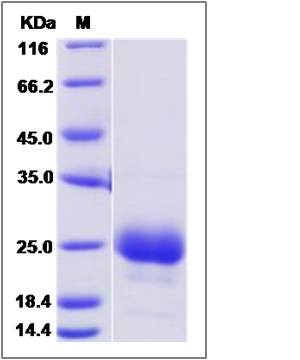Rhesus CD160 Protein
CD160
- 100ug (NPP1124) Please inquiry
| Catalog Number | P90224-CCCH |
|---|---|
| Organism Species | Rhesus |
| Host | Human Cells |
| Synonyms | CD160 |
| Molecular Weight | The recombinant rhesus CD160 comprises 141 amino acids and has a calculated molecular mass of 15.6 KDa. |
| predicted N | Gly 25 |
| SDS-PAGE |  |
| Purity | > 90 % as determined by SDS-PAGE |
| Protein Construction | A DNA sequence encoding the rhesus CD160 (XP_001089019.1) (Met1-Leu158) was expressed with six amino acids (LEVLFQ) at the C-terminus. |
| Bio-activity | |
| Research Area | Immunology |Adaptive Immunity |Costimulation & Costimulatory Molecule |Other Costimulatory Molecules |
| Formulation | Lyophilized from sterile PBS, pH 7.4. 1. Normally 5 % - 8 % trehalose and mannitol are added as protectants before lyophilization. Specific concentrations are included in the hardcopy of COA. |
| Background | CD160 antigen, also known as Natural killer cell receptor BY55 and CD160, is a cell membrane protein which contains one Ig-like V-type (immunoglobulin-like) domain. CD160 is a GPI-anchored lymphocyte surface receptor in which expression is mostly restricted to the highly cytotoxic CD56(dim)CD16(+) peripheral blood NK subset. CD160 is a receptor showing broad specificity for both classical and non-classical MHC class I molecules. CD160 is expressed in spleen, peripheral blood, and small intestine. Expression of CD160 is restricted to functional NK and T cytotoxic lymphocytes. CD160 acts as a co-activator receptor for CD3-induced proliferation of CD4+ CD160+ T cells isolated from inflammatory skin lesions. Unique CD4+ CD160+ lymphocyte subset may play a role in the pathogenesis of skin inflammation. Activated NK lymphocytes release a soluble form of CD160 that functionally impairs the MHC-I-specific cytotoxic CD8(+) T lymphocyte responsiveness. |
| Reference |
